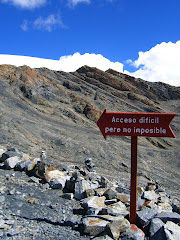CARE gave out 200 kits yesterday in 3 towns where they're building latrines. Kits include a 45 gallon orange trash can, of the kind that are used all over costal Peru to save water. The kits also had plastic plates and cups, soap, a smaller bucket with a faucet for saving boiled drinking water, a small pitcher, and a big CARE sticker to put on the giant orange trashcans.
It's 6 months after the earthquake but many, many communities still do not have a safe water source. The Municipal Government sends around a truck every so often, but it doesn't some at a regular interval so people are always very worried about having enough water. They were excited to be able to save another 45 gallons. The family of 6 that I lived with in Piura goes though more than 100 gallons in 2 days between washing, bathing, drinking, cooking and cleaning, and they're very conservative about the way that they use water. Being here is really an eye opening opportunity as to how much water human beings need to live.
In the first community we gave out 100 kits and it was madness and chaos. CARE made 240 latrines in that community in 240 different households. But, they only had 100 kits and gave them out on a first come first serve basis, on a weekday morning. There were many, many people waiting in the hot sun fighting and yelling that they should get the kit over their neighbor, that family X got 2 kits, etc... It was totally heartbreaking and a rather disappointing commentary on CARE's organizational skills. Ideally someone would have gone out there the day prior to sign up 100 families based on need. It's very hard to decide when everyone is in so much need, but as CARE executed the distribution the people who could advocate for themselves best got the most support, while the people who were not as able to advocate for themselves lost out and those folks are usually the worst off. When everyone has such dire needs it’s really hard to prioritize limited resources but what’s frustrating is that the resources shouldn’t really be so limited in a huge international aid organization like CARE. Distribution in the second and third communities went better because there were enough kits for all 70 households and in the 3rd community the CARE worker there had all 30 families signed up organized. It was much simpler and CARE met the expectations of all of the program participants. This is disappointingly unusual in aid work, so it was really great to see.
Another interesting part of the equation was that the kits apparently came from individual donors in the United States. The Project Manager started the distribution by giving a little talk explaining who CARE is and where the donations came from and people overwhelmingly grateful. At the end of the day we left the third community well after dark and much more humble for people's expressions of gratitude.
Thursday, March 06, 2008
Free Orange Trashcans
at 9:06 AM
Subscribe to:
Post Comments (Atom)

No comments:
Post a Comment